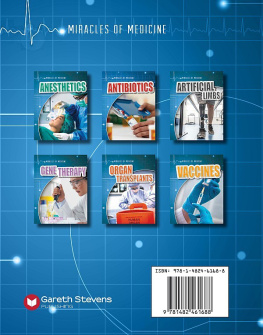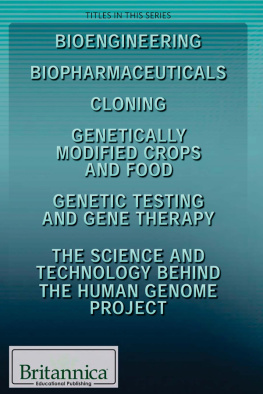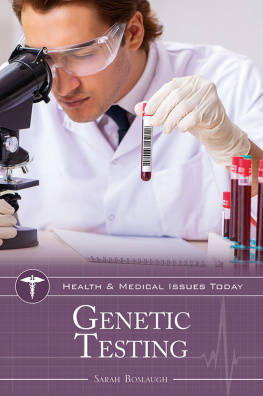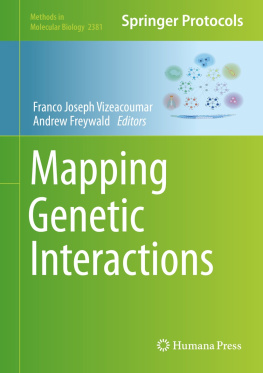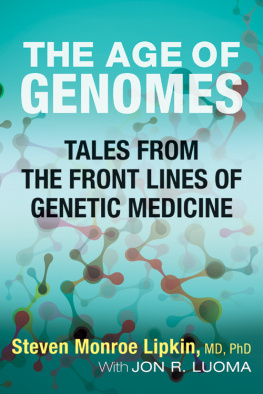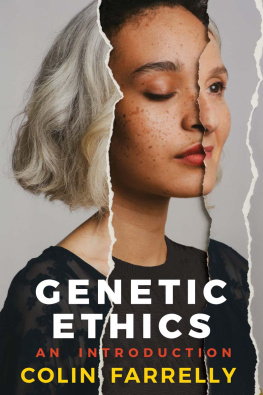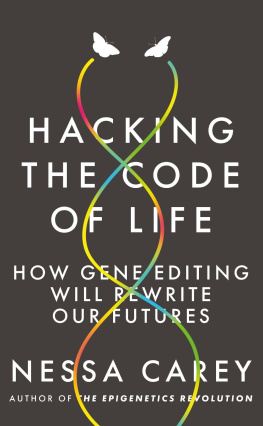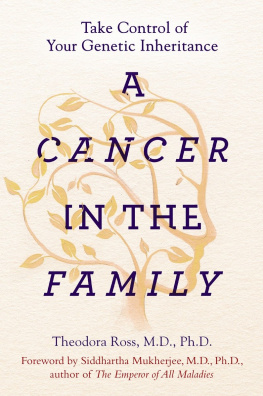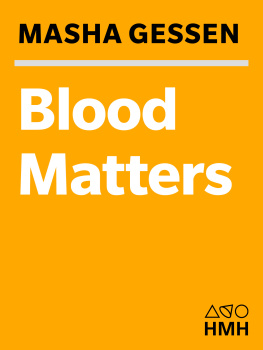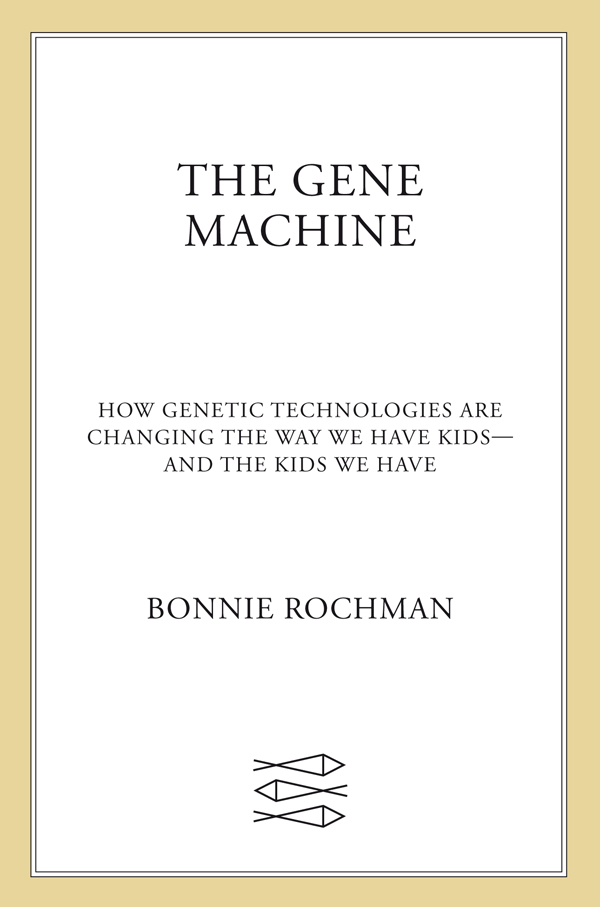Contents
Guide

The author and publisher have provided this e-book to you for your personal use only. You may not make this e-book publicly available in any way. Copyright infringement is against the law. If you believe the copy of this e-book you are reading infringes on the authors copyright, please notify the publisher at: us.macmillanusa.com/piracy.
* Please note that some of the links referenced in this work are no longer active .
For Aviv, Shira, and Orli, who couldnt be more perfect for me had they been designer babies
The unexamined life is not worth living.
Socrates
Hes perfect, pronounced the pediatrician at my two-week-old sons inaugural check-up. I flushed with happiness. What a nice thing for a doctor to say to an insecure first-time mom. And yet he was wrong. We all have genetic mutations. In fact, each human being kicks off life with about sixty new mutations, or changes in their genes.
Some are more obvious than others. Some cause problems, others dont. Nobodys perfect, the adage goes. When it comes to our genes, thats especially true.
In 2007, when I was pregnant with my third child, a routine ultrasound revealed a cyst on my daughters developing brain. Flat on my back in a darkened room, ultrasound goo smeared on my belly, I froze. Contending with any ominous-sounding cyst would have been bad enough, but processing the idea in conjunction with my babys brain, her tiny bodys command center, was chilling. I heard the doctor say that such bubbles frequently go away but may also indicate trisomy 18, a devastating genetic condition that is often fatal soon after birth, if not in utero. I could opt for what doctors call watchful waiting, keeping tabs on the cyst via ultrasound as my pregnancy progressed, or I could choose an amniocentesisa needle inserted into my wombto suction DNA for analysis from my daughters skin cells, free-floating in my amniotic fluid. In skilled hands, the risk of miscarriage is very low, but it still exists. What did I want to do?
I am an information junkie, so for me the decision was clear: my husband and I went straight from my doctors office to the office of the specialist who would do the amnio. It was a quick, if sharply painful, assault on my midriff. Predictably, I spent the next day or so panicked that I would miscarry, wondering if Id made the right choice. Then, on a Saturday afternoon in January, on my middle childs second birthday, the phone rang. The lab was calling to reassure me that initial results showed all the chromosomes where they should be. I sank onto the couch, folded the birthday girl, Shira, in her purple velvet frock and with her budding blond curls, into my arms, and cried with relief.
Imagine my confusion a few days later when our mail carrier shoved a copy of the lab report, which Id requested, through the mail slot. The amnio had indeed ruled out trisomy 18, but it had inadvertently revealed that my baby had a different, unrelated condition: inversion 9, a transposed ninth chromosome. For some reason, the top portion of the chromosome had landed on the bottom; the segment that was supposed to be on the bottom had migrated to the top. All the relevant information was still there; its akin to putting your underwear in your socks drawer and your socks in the drawer reserved for undies. You could still find the wayward socks and undergarments, arranged neatlythey just wouldnt be where they ordinarily reside.
It was, I learned, one of the most common genetic errors. Even the lab report dismissed its relevance, its technical language reassuring me that this genetic blooper was benign or, in the language of the lab, not associated with clinical effects. Perhaps, but I quickly found that knowing about it was strongly associated with emotional effects. One of my daughters chromosomes was upside down and I wasnt supposed to worry? Whats more, it was highly likely that either my husband or I had the same inversion, considering that the lab report noted that this topsy-turvy presentation was considered a normal familial variant.
To allay my fears, I took the ill-advised yet irresistible path that so many of us tread when faced with unfamiliar health-related information: I paged Dr. Google. I came across one small study that indicated an increased risk of schizophrenia, a finding that still makes me blanch when my daughter, Orli, throws a tantrum or acts particularly irrational, traits thatlets be honestare not wholly uncharacteristic of the average grade-schooler.
Still, I wasnt prepared for this surprise genetic discovery; nor are countless other parents who encounter similar situations. And yet our growing reliance on a constantly expanding arsenal of genetic tests to enhance our understanding of our children at their most basic cellular level means that this scenario is becoming routine. Its not that I wish I didnt know; Im glad I know, because now, if new research is published that finds Orlis error correlates with disease, Ill be paying close enough attention to delve into that research and see what I can do, if anything, to reduce her risks. Over the years, Ive assimilated the news of Orlis genetic anomaly, incorporating it into the vivid panorama that is my tennis-playing, panda-obsessed youngest child. I cant honestly say that I think about her chromosomal quirk on a daily or even weekly basis, but it does pop into my mind from time to time (remember those tantrums?), and sometimes I wonder: What if the lab report is wrong?
I first started paying attention to the increasing role that genetic testing is playing in childrens health back in 2011. I was covering parenting and pediatrics for Time and received an email from Pediatrics , the official journal of the American Academy of Pediatrics , about an intriguing study. The research explored parents eagerness to subject their children to tests that transcended the boundaries of the ever-growing catalog of genetic diseases comprising the routine newborn screening regimen that takes place in hospitals across the country. The research in question was fascinating: in a large group-practice health plan, 219 parents were offered testing for themselves for genetic variants associated with increased risk of eight fairly common adult-onset conditionsheart disease, high blood pressure, high cholesterol, Type 2 diabetes, osteoporosis, and cancers of the colon, skin, and lung. Asked if theyd like the same genetic testing for their children under age eighteen, the parents indicated that they thought the benefits of testing their kids outweighed any risks. Their gung-ho attitude seemed to stem from a belief that testing could certify their kids as grade-A healthy.
In fact, researchers had tried to talk the parents out of testing their kids (no kids were actually tested; researchers were simply trying to gauge interest) by telling them that there were no known health benefits to doing so, but the parents were not deterred. They may have assumed that their kidswhose average age was tenwould get a clean bill of health. Yet the fifteen different gene mutations associated with the eight diseases the parents were being screened for are so widespread that any particular child would likely have tested positive for nine mutations.
What? Really?! I exclaimed to Colleen McBride, senior author of the study and then chief of the Social and Behavioral Research Branch at the National Human Genome Research Institute (NHGRI). Parents, myself included until that moment, seemed pretty clueless about the stories that genes may whisper or shout within our bodies. Yet more and more genetic tests are being introducedand more and more genes are being singled out as potential troublemakers. We are learning more and more about our genome, our genetic code, but at the same time we still dont understand the basics. As McBride characterized the parents when I interviewed her for the Time story: The more they anticipated feeling good, the more they wanted to test. But the reality is, those parents are going to get bad news. Their kids are going to be at risk for something. So how are they going to react to that?


